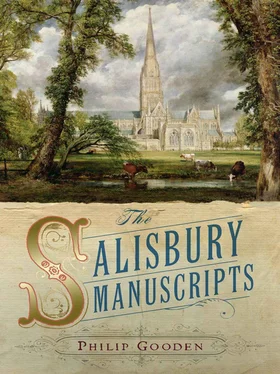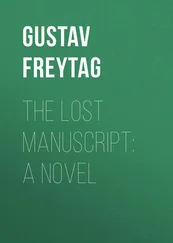Philip Gooden - The Salisbury Manuscript
Здесь есть возможность читать онлайн «Philip Gooden - The Salisbury Manuscript» весь текст электронной книги совершенно бесплатно (целиком полную версию без сокращений). В некоторых случаях можно слушать аудио, скачать через торрент в формате fb2 и присутствует краткое содержание. Год выпуска: 2009, Издательство: Soho Press, Жанр: Исторический детектив, на английском языке. Описание произведения, (предисловие) а так же отзывы посетителей доступны на портале библиотеки ЛибКат.
- Название:The Salisbury Manuscript
- Автор:
- Издательство:Soho Press
- Жанр:
- Год:2009
- ISBN:нет данных
- Рейтинг книги:3 / 5. Голосов: 1
-
Избранное:Добавить в избранное
- Отзывы:
-
Ваша оценка:
- 60
- 1
- 2
- 3
- 4
- 5
The Salisbury Manuscript: краткое содержание, описание и аннотация
Предлагаем к чтению аннотацию, описание, краткое содержание или предисловие (зависит от того, что написал сам автор книги «The Salisbury Manuscript»). Если вы не нашли необходимую информацию о книге — напишите в комментариях, мы постараемся отыскать её.
The Salisbury Manuscript — читать онлайн бесплатно полную книгу (весь текст) целиком
Ниже представлен текст книги, разбитый по страницам. Система сохранения места последней прочитанной страницы, позволяет с удобством читать онлайн бесплатно книгу «The Salisbury Manuscript», без необходимости каждый раз заново искать на чём Вы остановились. Поставьте закладку, и сможете в любой момент перейти на страницу, на которой закончили чтение.
Интервал:
Закладка:
Instead, he thought of his late brother. He had never liked Felix, regarding him as a sanctimonious hypocrite. He asked himself what he felt now that the holy Felix was no more. The answer was, he did not feel a great deal. There was no point in pretending to a piety that didn’t exist in him. He was, however, sorry about Walter. Not so much that Walter should have, like him, been so violently bereaved, but that he had gone to see the young man on the afternoon before Felix’s death. The visit had been the result of an impulse, a disastrous impulse. He recalled the look of shock on Walter’s face after they’d had their quiet chat in the gloom of the cathedral, the way Walter had gripped his knee as if he could not believe the other’s words, the way that Walter had sprung to his feet and rushed off into the gloom of the aisle. Percy hadn’t seen him again, or rather he had had only a brief glimpse of him when they were all crowding about the porch of Venn House, watching the lawyer fellow being taken away by the police. Walter had not looked well but sick and pale. Hardly surprising. Percy supposed that none of them looked any different.
Percy wondered about the circumstances leading up to Felix’s murder. He thought about his own involvement. He reached for the bottle and poured out the last bitter dregs.
Canon Eric Selby was the final person to have been present at the entrance to Venn House when Tom Ansell had been brought out like a man under arrest. Selby recalled the words which Tom claimed to have heard. The exclamation, surely involuntary, ‘He did it!’ Selby might even have uttered those words himself. It was, as he’d said, an idea which was in the air. Seeing a man with bloody hands escorted out of a house where a murder had occurred, anyone might have reached the same conclusion.
But none of this affected Eric Selby’s comfort. He had dined and drunk well in the company of his god-daughter or ‘niece’ Helen (and his wife, of course). They had talked about Helen’s father, Alfred, and recalled childhood holidays in Salisbury. When Helen had gone to bed, Eric Selby stayed up, musing on the death of Felix Slater. A terrible event, needless to say. But he could not find it in himself to summon up much grief for the man.
Mrs Banks’s House
It was Helen who came up with the idea that she and Tom should go off and see Mrs Banks, the sister of Andrew North, the sexton. From their conversation with Eric Selby, it was evident that North’s strange behaviour before his disappearance was being laid at Felix Slater’s door. There’d also been Selby’s mention of buried treasure and relics. This had gripped Helen’s imagination. She referred to it several times as the couple were walking through the close in search of the row of artisan cottages which lay tucked away out of sight of the cathedral and the grander houses. Tom thought of reminding Helen, again, that she wasn’t composing a melodramatic novel but in fact the words had pricked his curiosity too.
They found North’s dwelling in the middle of a neatly kept terrace. Here lived some of those who did manual work, both menial and skilled, in the cathedral and its precincts. Mrs Banks was a widowed woman who kept house for her brother and who, according to Selby, eked out a meagre income by taking in needlework. She had the look of a withered apple, red and wrinkled in the face. Once Helen had explained that they’d been directed there by Canon Selby, Mrs Banks’s attitude towards these well-dressed visitors shifted from wariness to welcome.
She invited them into a tiny parlour which doubled as a dining room. She apologized for the absence of a fire but it was early in the day and she was not expecting visitors. Tom and Helen were directed to sit on what was obviously her best bit of furniture, an old chaise, while Mrs Banks prepared the tea. Tom looked round. The room was spotless, the dining table polished like a mirror. By the sofa there were a few books on a shelf, more volumes than the Bible and a prayer book. Tom picked one up. He was slightly surprised to see that it was a history of Salisbury. Surprised that a cathedral sexton should possess such a thing. Yet who was to say that a man who earned his living with his hands shouldn’t also use his head? The book certainly belonged to the man for he had written his name in full — Andrew Herbert North — on the fly-leaf. The handwriting was neat and fluent, not that of an uneducated individual.
Hearing Mrs Banks returning, Tom quickly put the book back on the shelf. The sexton’s sister came into the parlour with a tray, on which was a teapot and china cups. She served Tom and Helen and perched on a wooden chair facing them. Tom explained that he was acting for the lawyers who had represented Canon Felix Slater. He implied that he was looking into the Canon’s affairs, which was true enough, and that they’d been told that Mrs Banks might be able to help them, particularly over the link between her brother and the Canon. Mrs Banks’s face wrinkled still further at the mention of Felix Slater — by now Tom was getting used to this response to Slater’s name — but she just about managed to express regret and horror over the terrible murder.
‘None of us have slept safe and sound in our beds since it happened,’ she said. ‘Mind you, I haven’t slept sound neither after my brother Andrew went off. It is over four weeks since he left here saying he was going for a walk, and he has never come back and I do not know that he ever will come back. I missed my husband Banks when he was gone but, truth be told, I miss my brother more.’
She was close to tears. Helen got up and put her arm round the older woman and produced a handkerchief. Mrs Banks put aside her teacup on the dining table. She dabbed at her eyes and then admired the stitching on the handkerchief while she composed herself and Helen sat down again next to Tom.
‘Thank you, my dear,’ she said, and then to Tom, ‘Forgive me, sir, but sometimes it is all too much to bear. Inspector Foster has been kind in his official way and says that he is still making enquiries about my brother, but in the next breath he will say that Andrew is a grown man and he cannot have come to much harm and no one bears a grudge against him and he is no one’s enemy and he will surely turn up one day and walk through that door there.’
She glanced towards the tiny hallway beyond the parlour, as if she expected her brother to appear at that instant. Once Mrs Banks had overcome her initial reserve, she started talking in long breathless stretches. Tom thought it was a relief for her to have sympathetic listeners.
‘Your brother was not in any kind of trouble?’ said Helen.
‘No, miss, he is an honest workman. Everyone speaks well of him.’
Tom said, ‘We have heard that Mr North used to do some work for Canon Slater.’
‘The Canon employed him to do odd jobs. Mrs Slater’s dog died not very long ago and Andrew dug a grave for him in the garden. But he did other things as well.’
‘Other things?’
‘Canon Slater is — no, he was, I should say the Canon was — a man who went digging and delving in the country around here. He was looking for old arty — arty somethings.’
‘Artefacts,’ prompted Tom.
‘That’s the word. Being a gentleman, Canon Slater didn’t do much of the digging and delving himself but got my brother to do it instead.’
‘What did they find?’ said Helen. ‘They must have found things.’
‘It didn’t look like much to me, miss, but then I expect the Canon took the best pieces for himself.’
‘So you saw items which your brother dug up,’ said Tom. ‘Maybe he showed them to you.’
‘I remember an evening, last spring it would have been, when Andrew came in like a blast of cold air, all high-coloured in the face and excited. He and Canon Slater had been out somewhere beyond the city and they had uncovered. .’
Читать дальшеИнтервал:
Закладка:
Похожие книги на «The Salisbury Manuscript»
Представляем Вашему вниманию похожие книги на «The Salisbury Manuscript» списком для выбора. Мы отобрали схожую по названию и смыслу литературу в надежде предоставить читателям больше вариантов отыскать новые, интересные, ещё непрочитанные произведения.
Обсуждение, отзывы о книге «The Salisbury Manuscript» и просто собственные мнения читателей. Оставьте ваши комментарии, напишите, что Вы думаете о произведении, его смысле или главных героях. Укажите что конкретно понравилось, а что нет, и почему Вы так считаете.












